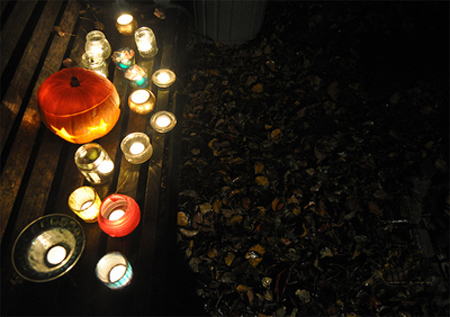
Around Halloween there can be a frenzy about whether the festival is a celebration of paganism. For some people this is an interesting historical question: was Halloween originally a pagan festival? For others it arises from a passionate concern about good and evil: if Halloween is really pagan should children be protected from it? Before I say why I think Halloween provides an example of something that both Christians and Pagans can and do celebrate, let’s first be clear about some historical facts.
Medieval sources make it certain that the 31st October and the 1st November were important festive occasions in Ireland and Wales. In Ireland the festival was known as “Samhain”, in Wales it was called “Calan Gaeaf”, honouring the end of summer and the beginning of winter. In both places, gatherings for legal disputes, games and festivities could take place. Possibly some popular customs associated with this time originated in pre-Christian times. Bonfires and merriment, for example, might have begun in ancient festivals that marked significant turning points in the year. There is also evidence of a widespread idea that otherworldly beings (faeries or elves rather than space-aliens) might troop through this world during these days of transition between the seasons (as they were thought to do on May-eve and May-day).
In the year 837, the 1st November was officially declared to be the feast of All Saints (or “All Hallows”) in the Christian calendar. Later, the festival of All Souls, honouring the wider community of “faithful departed” (i.e. deceased Christians), was added on the 2nd November. It is sometimes asserted that the pre-Christian festival of Samhain and the Christian feasts beginning on All Hallows Eve (Halloween) share an emphasis on honouring the dead. There is, however, no secure historical evidence that the ancient festival had any such association. It was about changing seasons — something of great importance in many cultures.
To summarise: the festivals celebrated by some Christians and some Pagans around the 31st October and 1st November have different origins and different emphases. But history isn’t everything. Times change. Emphases change. Some Christians are happy to join in the bonfires and amusements that celebrate changing seasons more than they revere faithful role models. Similarly, some Pagans gladly honour their ancestors at a time when those ancestors might have been more interested in the turning of the wheel of the year.
If the histories of these festivals differ, what do Christians and Pagans have in common? Today, some people find it important to honour their ancestors (whether they died in antiquity or recently). Halloween can seem a good time to respect the dead, but it is not the only time to do so. Many of the Christians who object to Halloween celebrations are deeply interested in the speeches and acts of earlier generations, perhaps even displaying pictures of them in their churches. Pagans and Christians have already learnt and borrowed from each other’s festival repertoires. It is possible that both could learn more from each other, as they might from the celebrations and interests of other communities (religious or otherwise).






Rate and Review
Rate this article
Review this article
Log into OpenLearn to leave reviews and join in the conversation.
Article reviews